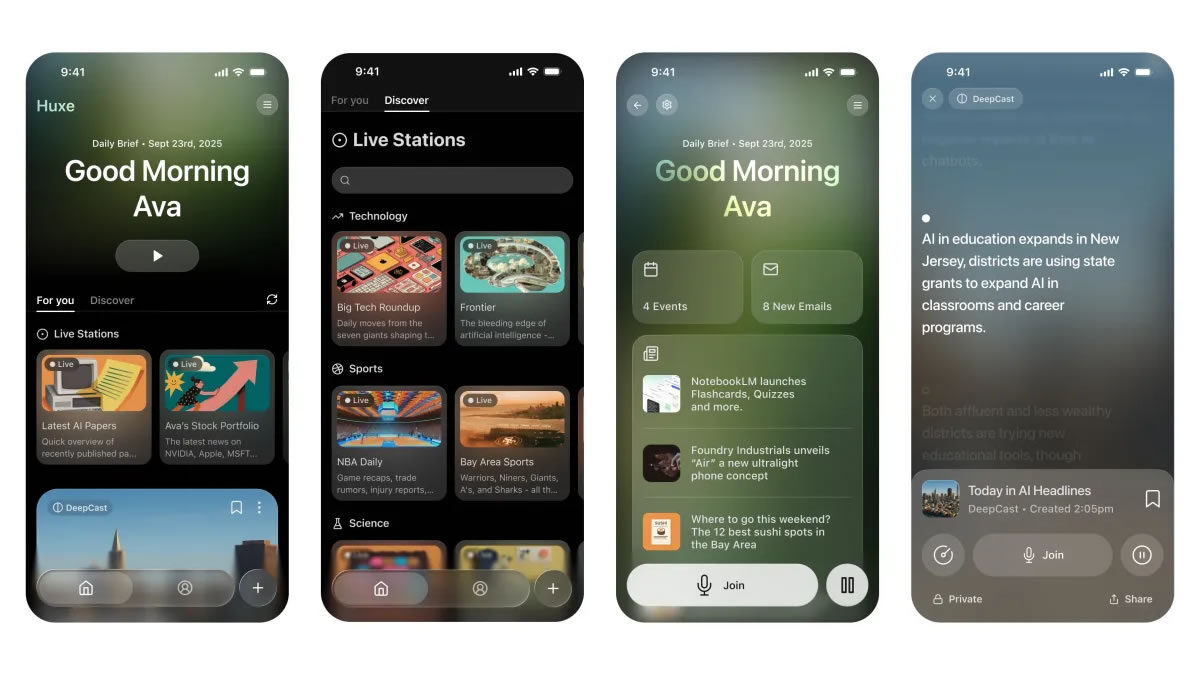Former NotebookLM developers’ new app, Huxe, draws upon audio to assist you with news and research. Google’s AI note-taking and research companion, NotebookLM, launched to an impressive reception, capturing audiences’ imaginations with its ability to rapidly create summaries and reports and convert large documents into podcasts with AI hosts conversing about the topic to assist users in their studies.
Stay up to date with the latest technology in TheTechCrunch.info, which covers artificial intelligence, mobile and web apps, modern things, cyber security, and general technical news. From AI’s successes to chat and generative tools, such as smartphones, laptops, and wearables’ special reviews, TheTechCrunch gives an insight into this case.
From NotebookLM to Huxe
Motivated by the success of the project, three developers who worked on NotebookLM from its start are now constructing an audio-centric app called Huxe, which can similarly help users delve deeper into subjects by generating a podcast with multiple AI presenters. The startup announced on Tuesday that it had secured $4.6 million in financing from Conviction, Genius Ventures, Figma CEO Dylan Field, and Google Research’s Chief Scientist Jeff Dean.

Launch and Expansion
The app launched on an invite-only basis in June and is now accessible to everyone on iOS and Android. Raiza Martin, together with Jason Spielman and Stephen Hughes, left Google in December 2024 to pursue their own ideas. They initially introduced a chatbot aimed toward more B2B purposes but chose to focus on the consumer market and built a personal assistant in March 2025 that could produce personalized images, videos, and audio.
Realizing the Demand
During this period, they realized that people appreciated having the capacity to generate audio for diverse topics. They also noticed that people frequently used the app at certain times to get their daily briefing or catch up with news while preparing, Martin told TechCrunch. That understanding led the three to concentrate on audio and develop Huxe.
Key Features
Huxe essentially provides you with a daily briefing based on the emails you receive and by connecting to your calendars to understand your schedule. It also allows you to explore subjects, and like NotebookLM, it will create a podcast with AI hosts discussing the topic. You can interact with the AI hosts at any time, ask questions about the subject, or request them to clarify points differently.
Unique Capabilities
What differs here is that Huxe enables users to build a live station on any topic, like tech news, sports, or even celebrity gossip. After you listen to a station, the app will give you updates by pulling from various sources, which is helpful for following evolving news. There is also a personalized interest feed that automatically produces audio material that could interest you. Martin said that during the early NotebookLM days, a group of power users drove the product feedback, and Huxe is experiencing similar patterns.
Target Audience and Market
This is a well-suited product for people who spend all day on their screens with many tabs open on their browsers. People who might want to catch up on their email, schedule, and news can do that without looking at their screen, she said.
Future Possibilities
Huxe currently fits the information market, but entertainment can be a potential use case too. India-based audio companies like Pocket FM and Kuku FM, for example, use AI to allow users to create content. And Huxe is not the only one employing audio as a medium. Startups like ElevenLabs and Oboe are utilizing audio, too, as are Google and Meta.
Personalized Audio Recommendations
Huxe not only generates podcasts but also studies listening behavior to deliver tailored recommendations. By analyzing the subjects you follow, the app curates a playlist of audio briefings suited to your interests. This ensures that instead of scrolling through many sources, you get a constant stream of relevant materials. Over time, the system becomes more accurate and creates a specific personal experience for each listener.
Collaboration and Shared Playlists
The app searches for social features and allows users to share playlists or stations with friends or colleagues. Teams working on research or projects can compile the current sound segment at the same time, making groups easier to learn. This feature encourages collaboration without the need to be online together. By gathering sources, listeners can highlight new insights and replace Huxes with valuable collaboration equipment for both professional and personal use.
Accessibility and Multilingual Support
HUX developers also prioritize access and multilingual abilities. Users can switch between languages or add captions for people with hearing difficulties. The app interface is designed with inclusive appropriate principles and ensures that individuals with different requirements can easily navigate. Such characteristics open the stage to a global audience, which is expanded beyond the beginning adopters and is seen as a more inclusive tool for gathering and understanding information worldwide.

Privacy and Data Protection
While Huxe connects to the e-post and calendars, the team emphasizes strong privacy measures. Personal information is safely processed and is never sold to advertisers. Encryption and permission control give users confidence when adding accounts. These security measures are today to separate huxes from other AI-driven platforms, and deal with one of the main concerns of consumers. By protecting the information, offering individual functions, constructing Huxe confidence, and setting a high standard in the sound-assisted space.
Explore a complete hub for the latest apps, smart things, and security updates online, ranging from AI-operated solutions and automation tools. TheTechCrunch.info offers in-depth articles, comparisons, and specialist analysis designed to understand the rapidly changing technology. Whether you are keen on robotics, data protection, or the latest digital trends.


